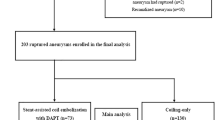Abstract
We aimed to evaluate the correlation between aspirin or clopidogrel resistance and the risk of thromboembolic events (TEs). Between June 2011 and April 2015, we reviewed clinical and angiographic characteristics, and TEs in the patients undergoing stent-assisted coil embolization (SAC) of unruptured intracranial aneurysms (UIA) at our institution. We did not modify antiplatelet medication in patients with resistance. The relationships between antiplatelet resistance and the occurrence of acute symptomatic TEs, any diffusion-positive lesions, multiple diffusion-positive lesions, or delayed TEs were investigated. Ninety-nine endovascular treatments with stent-assisted technique were performed on 99 patients. The prevalence of aspirin resistance was 12% and clopidogrel resistance was 62.6%. Acute symptomatic TEs were demonstrated in 4 patients (4%). Diffusion-positive lesions were found in 82 patients [82.1%; 36 patients were group I (≤5) and 46 patients were group II (>5)]. Delayed TEs were demonstrated in 10 patients (10.1%). Neither aspirin resistance nor clopidogrel resistance was relevant to the development of acute symptomatic TEs, any diffusion-positive lesions, multiple diffusion-positive lesions, and delayed TEs (P logistic = not available, 0.448, 0.362, and 0.829 for aspirin resistance and P logistic = 0.607, 0.367, 0.278, and 0.245 for clopidogrel resistance). Without modification of antiplatelet medication, we demonstrated 4% of acute symptomatic TEs and 10% of delayed TEs. Aspirin or clopidogrel resistance did not show significant relationships with acute and delayed TEs in the SAC of UIA.
Similar content being viewed by others
Abbreviations
- UIA:
-
Unruptured intracranial aneurysm
- SAC:
-
Stent-assisted coil embolization
- TE:
-
Thromboembolic events
- ARU:
-
Aspirin reaction units
- PRU:
-
P2Y12 reaction units
- AR:
-
Aspirin resistance
- CR:
-
Clopidogrel resistance
References
Yamada NK, Cross DT 3rd, Pilgram TK, Moran CJ, Derdeyn CP, Dacey RG Jr (2007) Effect of antiplatelet therapy on thromboembolic complications of elective coil embolization of cerebral aneurysms. AJNR Am J Neuroradiol 28:1778–1782. doi:10.3174/ajnr.A0641
Oxley TJ, Dowling RJ, Mitchell PJ, Davis S, Yan B (2011) Antiplatelet resistance and thromboembolic complications in neurointerventional procedures. Front Neurol 2:83. doi:10.3389/fneur.2011.00083
Lee DH, Kim HS, Kim SM, Kwon SU, Suh DC (2012) Change of platelet reactivity to antiplatelet therapy after stenting procedure for cerebral artery stenosis: verifyNow antiplatelet assay before and after stenting. Neurointervention 7(1):23–26
Adams HP Jr, Bendixen BH, Kappelle LJ, Biller J, Love BB, Gordon DL, Marsh EE 3rd (1993) Classification of subtype of acute ischemic stroke. Definitions for use in a multicenter clinical trial. TOAST. Trial of Org 10172 in Acute Stroke Treatment. Stroke 24:35–41
Delgado Almandoz JE, Crandall BM, Scholz JM, Fease JL, Anderson RE, Kadkhodayan Y, Tubman DE (2013) Pre-procedure P2Y12 reaction units value predicts perioperative thromboembolic and hemorrhagic complications in patients with cerebral aneurysms treated with the Pipeline Embolization Device. J Neurointerv Surg 5(Suppl 3):iii3–iii10. doi:10.1136/neurintsurg-2012-010582
Hwang G, Huh W, Lee JS, Villavicencio JB, Villamor RB Jr, Ahn SY, Kim J, Chang JY, Park SJ, Park NM, Jeong EA, Kwon OK (2015) Standard vs modified antiplatelet preparation for preventing thromboembolic events in patients with high on-treatment platelet reactivity undergoing coil embolization for an unruptured intracranial aneurysm: a randomized clinical trial. JAMA Neurol 72:764–772. doi:10.1001/jamaneurol.2015.0654
Gandhi CD, Bulsara KR, Fifi J, Kass-Hout T, Grant RA, Delgado Almandoz JE, English J, Meyers PM, Abruzzo T, Prestigiacomo CJ, Powers CJ, Lee SK, Albani B, Do HM, Eskey CJ, Patsalides A, Hetts S, Hussain MS, Ansari SA, Hirsch JA, Kelly M, Rasmussen P, Mack W, Pride GL, Alexander MJ, Jayaraman MV, Standards S, Guidelines C (2014) Platelet function inhibitors and platelet function testing in neurointerventional procedures. J Neurointerv Surg 6:567–577. doi:10.1136/neurintsurg-2014-011357
Acknowledgements
The statistical consultation was supported by a Grant of the Korean Health Technology R&D Project, Ministry of Health & Welfare, Republic of Korea (HI14C1731).
Author information
Authors and Affiliations
Corresponding author
Ethics declarations
Conflict of interest
The authors report no conflict of interest concerning the materials or methods used in this study or the findings specified in this paper.
Rights and permissions
About this article
Cite this article
Song, J., Shin, Y.S. Antiplatelet drug resistance did not increase the thromboembolic events after stent-assisted coiling of unruptured intracranial aneurysm: a single center experience of 99 cases. Neurol Sci 38, 879–885 (2017). https://doi.org/10.1007/s10072-017-2859-z
Received:
Accepted:
Published:
Issue Date:
DOI: https://doi.org/10.1007/s10072-017-2859-z




